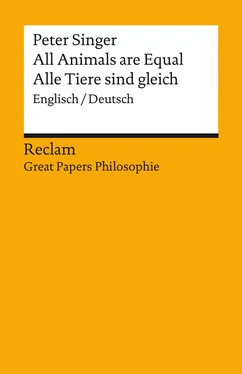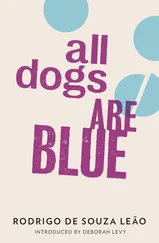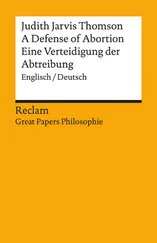Peter Singer
All Animals are Equal
Alle Tiere sind gleich
Englisch/Deutsch
Aus dem Englischen übersetzt und herausgegeben von Adriano Mannino und Marina Moreno
Reclam
2022 Philipp Reclam jun. Verlag GmbH, Siemensstraße 32, 71254 Ditzingen
© Peter Singer
Covergestaltung: Cornelia Feyll, Friedrich Forssman
Gesamtherstellung: Philipp Reclam jun. Verlag GmbH, Siemensstraße 32, 71254 Ditzingen
Made in Germany 2022
RECLAM ist eine eingetragene Marke der Philipp Reclam jun. GmbH & Co. KG, Stuttgart
ISBN 978-3-15-961970-5
ISBN der Buchausgabe 978-3-15-014062-8
www.reclam.de
[103] In recent years a number of oppressed groups have campaigned vigorously for equality. The classic instance is the Black Liberation movement, which demands an end to the prejudice and discrimination that has made blacks second-class citizens. The immediate appeal of the black liberation movement and its initial, if limited, success made it a model for other oppressed groups to follow. We became familiar with liberation movements for Spanish-Americans, gay people, and a variety of other minorities. When a majority group – women – began their campaign, some thought we had come to the end of the road. Discrimination on the basis of sex, it has been said, is the last universally accepted form of discrimination, practiced without secrecy or pretense even in those liberal circles that have long prided themselves on their freedom from prejudice against racial minorities.
One should always be wary of talking of “the last remaining form of discrimination.” If we have learnt anything from the liberation movements, we should have learnt how difficult it is to be aware of latent prejudice in our attitudes to particular groups until this prejudice is forcefully pointed out.
A liberation movement demands an expansion of our moral horizons and an extension or reinterpretation of the basic moral principle of equality. Practices that were previously regarded as natural and inevitable come to be seen as the result of an unjustifiable prejudice. Who can say with confidence that all his or her attitudes and practices are beyond criticism? If we wish to avoid being numbered amongst the oppressors, we must be prepared to re-think even our most fundamental attitudes. We need to consider them from the point of view of those most disadvantaged by our attitudes, and the practices that follow from these attitudes. If we can make this unaccustomed mental switch we may discover a pattern in our attitudes and practices that consistently operates so as to benefit one group – usually the one to which we ourselves belong – at the expense of another. In this way we may come to see that there is a case for a new liberation movement. My aim is to advocate that we make this mental switch in respect of our attitudes and practices towards a very large group of beings: members of species other than our own – or, as we popularly though misleadingly call them, animals. In other words, I am urging that we extend to other species the basic principle of equality that most of us recognize should be extended to all members of our own species.
All this may sound a little far-fetched, more like a parody of other liberation movements than a serious objective. In fact, in the past the idea of “The Rights of Animals” really has been used to parody the case for women’s rights. When Mary Wollstonecraft, a forerunner of later feminists, published her Vindication of the Rights of Women in 1792, her ideas were widely regarded as absurd, and [104] they were satirized in an anonymous publication entitled A Vindication of the Rights of Brutes . The author of this satire (actually Thomas Taylor, a distinguished Cambridge philosopher) tried to refute Wollstonecraft’s reasonings by showing that they could be carried one stage further. If sound when applied to women, why should the arguments not be applied to dogs, cats, and horses? They seemed to hold equally well for these ‘brutes’; yet to hold that brutes had rights was manifestly absurd; therefore the reasoning by which this conclusion had been reached must be unsound, and if unsound when applied to brutes, it must also be unsound when applied to women, since the very same arguments had been used in each case.
One way in which we might reply to this argument is by saying that the case for equality between men and women cannot validly be extended to nonhuman animals. Women have a right to vote, for instance, because they are just as capable of making rational decisions as men are; dogs, on the other hand, are incapable of understanding the significance of voting, so they cannot have the right to vote. There are many other obvious ways in which men and women resemble each other closely, while humans and other animals differ greatly. So, it might be said, men and women are similar beings and should have equal rights, while humans and nonhumans are different and should not have equal rights.
The thought behind this reply to Taylor’s analogy is correct up to a point, but it does not go far enough. There are important differences between humans and other animals, and these differences must give rise to some differences in the rights that each have. Recognizing this obvious fact, however, is no barrier to the case for extending the basic principle of equality to nonhuman animals. The differences that exist between men and women are equally undeniable, and the supporters of Women’s Liberation are aware that these differences may give rise to different rights. Many feminists hold that women have the right to an abortion on request. It does not follow that since these same people are campaigning for equality between men and women they must support the right of men to have abortions too. Since a man cannot have an abortion, it is meaningless to talk of his right to have one. Since a pig can’t vote, it is meaningless to talk of its right to vote. There is no reason why either Women’s Liberation or Animal Liberation should get involved in such nonsense. The extension of the basic principle of equality from one group to another does not imply that we must treat both groups in exactly the same way, or grant exactly the same rights to both groups. Whether we should do so will depend on the nature of the members of the two groups. The basic principle of equality, I shall argue, is equality of consideration; and equal consideration for different beings may lead to different treatment and different rights.
So there is a different way of replying to Taylor’s attempt to parody Wollstonecraft’s arguments, a way which does not deny the differences between humans and nonhumans, but goes more deeply into the question of equality and concludes by finding nothing absurd in the idea that the basic principle of equality applies to so-called ‘brutes’. I believe that we reach this conclusion if we examine the basis on which our opposition to discrimination on grounds of [105] race or sex ultimately rests. We will then see that we would be on shaky ground if we were to demand equality for blacks, women, and other groups of oppressed humans while denying equal consideration to nonhumans.
When we say that all human beings, whatever their race, creed, or sex, are equal, what is it that we are asserting? Those who wish to defend a hierarchical, inegalitarian society have often pointed out that by whatever test we choose, it simply is not true that all humans are equal. Like it or not, we must face the fact that humans come in different shapes and sizes; they come with differing moral capacities, differing intellectual abilities, differing amounts of benevolent feeling and sensitivity to the needs of others, differing abilities to communicate effectively, and differing capacities to experience pleasure and pain. In short, if the demand for equality were based on the actual equality of all human beings, we would have to stop demanding equality. It would be an unjustifiable demand.
Читать дальше












